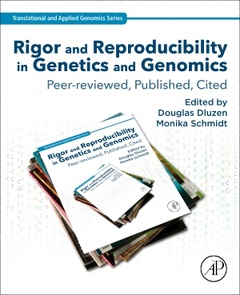Rigor and Reproducibility in Genetics and Genomics Peer-reviewed, Published, Cited Translational and Applied Genomics Series
Directeur de Collection : Patrinos George P.

Rigor and Reproducibility in Genetics and Genomics: Peer-reviewed, Published, Cited provides a full methodological and statistical overview for researchers, clinicians, students, and post-doctoral fellows conducting genetic and genomic research.
Here, active geneticists, clinicians, and bioinformaticists offer practical solutions for a variety of challenges associated with several modern approaches in genetics and genomics, including genotyping, gene expression analysis, epigenetic analysis, GWAS, EWAS, genomic sequencing, and gene editing. Emphasis is placed on rigor and reproducibility throughout, with each section containing laboratory case-studies and classroom activities covering step-by-step protocols, best practices, and common pitfalls. Specific genetic and genomic technologies discussed include microarray analysis, DNA-seq, RNA-seq, Chip-Seq, methyl-seq, CRISPR gene editing, and CRISPR-based genetic analysis. Training exercises, supporting data, and in-depth discussions of rigor, reproducibility, and ethics in research together deliver a solid foundation in research standards for the next generation of genetic and genomic scientists.
SECTION 1 Introduction 1. Rigor and reproducibility in genetic research and the effects on scientific reporting and public discourse 2. Unveiling the hidden curriculum: Developing rigor and reproducibility values through teaching and mentorship SECTION 2 Genotyping 3. Genome-wide association studies (GWAS): hat are they, when to use them? 4. GWAS in the learning environment 5. Polygenic risk scores and comparative genomics: Best practices and statistical considerations 6. DNA sequencing and genotyping in the classroom 7. Classroom to career: Implementation considerations for engaging students with meaningful DNA sequencing learning opportunities SECTION 3 Next-generation sequencing & gene expression 8. Review of gene expression using microarray and RNA-seq 9. Guidelines and important considerations for ‘omics-level studies 10. Best practices for statistical analysis of omics data 11. Validation of gene expression by quantitative PCR SECTION 4 Epigenetic analyses 12. Best practices for epigenome-wide DNA modification data collection and analysis 13. Best practices for the ATAC-seq assay and its data analysis 14. Best practice for ChIP-seq and its data analysis 15. A practical guide for essential analyses of Hi-C data 16. Epigenetics in the classroom SECTION 5 Gene editing technologies 17. Genome editing technologies 18. Genetic modification of mice using CRISPR-Cas9: Best practices and practical concepts explained 19. CRISPR classroom activities and case studies
George P. Patrinos is Professor of Pharmacogenomics and Pharmaceutical Biotechnology in the University of Patras (Greece), Department of Pharmacy, Head of Division of Pharmacology and Biosciences of the same Department and holds adjunct Full Professorships at Erasmus MC, Faculty of Medicine, Rotterdam (the Netherlands) and the United Arab Emirates University, College of Medicine, Department of Genetics and Genomics, Al-Ain (UAE). Also, since March 2018, he is Chair of the Global Genomic Medicine Collaborative (G2MC) and since May 2023 Chairman of the Scientific Advisory Board of the ASPIRE Abu Dhabi Precision Medicine Research Institute. He has ample regulatory experience, as he served for 12.5 years as Full Member and Greece’s National representative in the CHMP Pharmacogenomics Working Party of the European Medicines Agency (EMA) and he is still an active member of the European Medicines Agency participating in expert panels to provide scientific advice where needed. George is currently Director of the Laboratory of Pharmacogenomics and Individualized Therapy, the first officially established academic pharmacogenomics laboratory in Greece. His group has keen interest in research covering disciplines from wet and dry lab and public health genomics projects, all focusing on pharmacogenomics and personalized medicine. In particular, his research interests involve discovery work and clinical implementation of pharmacogenomics, focusing in particular in psychiatry but also cardiology and oncology, genomics of rare disorders and transcriptional regulation of human fetal globin genes. Moreover, George’s group is internationally recognized for its involvement in developing National/Ethnic Genetic databases to document the genetic heterogeneity in different populations worldwide and of genome informatics tools to translate genomic information into a clinically meaningful format. Also, George’s group has a k
- Provides practical approaches and step-by-step protocols to strengthen genetic and genomic research conducted in the lab or classroom
- Presents illustrative case studies and training exercises and discusses common pitfalls and solutions for genotyping, gene expression analysis, epigenetic analysis, GWAS, EWAS, genomic sequencing, and gene editing, among other genetic and genomic approaches
- Examines best practices for microarray analysis, DNA-seq, RNA-seq, gene expression validation, Chip-Seq, methyl-seq, CRISPR gene editing, and CRISPR-based genetic analysis
- Written to provide trainees and educators approachable and useful tools and strategies to employ in their research, whether for the first time or to troubleshoot current methodologies
Date de parution : 11-2023
Ouvrage de 502 p.
19x23.4 cm
Thèmes de Rigor and Reproducibility in Genetics and Genomics :
Mots-clés :
<; P>; : genetics; genomics; human genetics; human genomics; genomic research; genetic research; genomic research methods; genetic research methods; human genetics methods; human genomics methods; genomics protocols; genetic protocols; genomics research best practices; genetics research best practices; GWAS methods; GWAS protocols; GWAS best practices; CRISPR methods; CRISPR protocols; CRISPR best practices; genetic studies; Genotyping; GWAS studies<; /P>; <; P>; GWAS; GWAS learning; DNA sequencing; comparative genomics<; /P>; <; P>; rigorous genome sequence; analyses; genotype imputations; Gene Expression; gene expression using microarray; RNA-seq; gene expression data; gene expression studies; Epigenetic Analyses; DNA methylation; omics data; Chip-Seq; methyl-seq; epi datasets; teaching epigenetics; Gene Editing Technologies; CRISPR; CRISPR-based genetic analysis; CRISPR classroom activities<; /P>; <; P>; <; /P>



